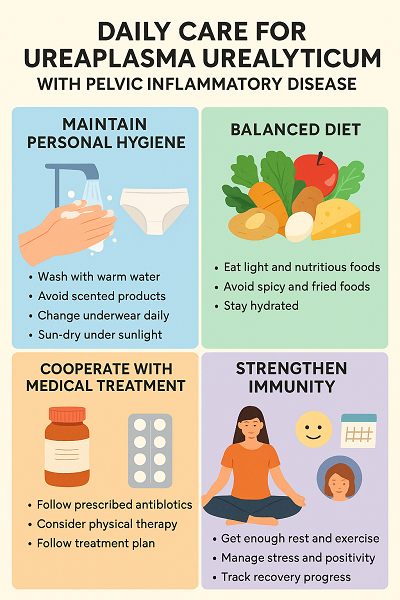Daily Care Tips for Pelvic Inflammatory Disease Caused by Ureaplasma Urealyticum
The female reproductive system is like a delicate flower that requires careful protection. When Ureaplasma urealyticum takes the opportunity to cause trouble and leads to pelvic inflammatory disease (PID), it not only causes physical discomfort but may also affect fertility.
Normally, this pathogen may remain dormant in the urinary and reproductive tract, but once immunity declines, it can spread upward, causing PID and resulting in chronic pain or even infertility. Therefore, mastering scientific daily care methods is essential for recovery and prevention. Let’s go through the key points step by step.

1. Maintain Personal Hygiene: The First Line of Defense
Personal hygiene is the first barrier against Ureaplasma infection and worsening PID. Develop the habit of washing the vulva with warm water daily to keep it clean and dry. Avoid using heavily scented or irritating cleansing products, as these can disrupt the normal environment of the genital area. Underwear should be changed daily, preferably pure cotton and breathable. Wash thoroughly and dry under sunlight when possible, allowing ultraviolet rays to help with sterilization.
Sexual hygiene is particularly important. Ureaplasma spreads through sexual contact, and unprotected or unclean sexual activity greatly increases the risk of infection. During treatment, sexual activity should be avoided to prevent reinfection or cross-infection. Even after recovery, partners should practice good hygiene and consider using condoms when necessary. Women should also pay extra attention during special periods such as menstruation and postpartum, when immunity is weaker, by changing sanitary products frequently and reducing infection risks.
2. Balanced Diet: Supporting the Body’s Recovery
Diet plays a crucial role in managing PID caused by Ureaplasma. Meals should be light and easily digestible, avoiding spicy foods such as chili, pepper, and ginger, as these may worsen inflammation. Instead, focus on vegetables, fruits, and whole grains, which are rich in vitamins, minerals, and fiber, to boost immunity.
Adequate protein intake is essential for tissue repair, so foods such as eggs, milk, lean meat, and fish are recommended. Staying well-hydrated is also important, as frequent urination helps flush out toxins and supports recovery. Avoid excessive raw or cold foods, as they may affect digestion and indirectly slow the healing process.
3. Cooperate with Medical Treatment
(1) Standardized Medication
Medication remains the cornerstone of treating PID caused by Ureaplasma. Doctors usually prescribe antibiotics based on sensitivity tests. Common choices include macrolides such as azithromycin or tetracyclines like doxycycline. Patients must complete the full course to eradicate the pathogen and prevent resistance. Stopping medication early or reducing dosage without medical advice may cause relapse.
If symptoms such as abdominal pain or abnormal vaginal discharge occur, local medications such as metronidazole suppositories or baofukang suppositories may be used under medical guidance to enhance treatment. Some patients may also require cephalosporins (e.g., cefixime) or amoxicillin depending on their condition.
(2) Physical Therapy
Alongside antibiotics, physical therapies such as laser therapy, shortwave, microwave, infrared, or hot compresses may be used. These treatments improve pelvic blood circulation, accelerate absorption of inflammation, and relieve congestion and pain. However, all procedures must be performed under professional guidance to avoid overstimulation or complications.
(3) Integrating Traditional Chinese Medicine
Traditional Chinese Medicine (TCM) can complement antibiotic treatment. Herbal remedies with heat-clearing and blood-circulation-promoting properties, such as Fuyan Pill, can help reduce inflammation, improve pelvic microcirculation, and promote tissue repair. This integrative approach may shorten recovery time and reduce the likelihood of recurrence.
4. Strengthen Lifestyle Management and Boost Immunity
(1) Regular Rest and Moderate Exercise
Good sleep and regular routines are vital for immune defense. Avoid staying up late, as sleep deprivation reduces resistance to infection. Moderate exercise such as walking, yoga, or light jogging helps enhance metabolism and strengthen immunity, reducing relapse risks. Intensity should remain moderate to avoid overexertion.
(2) Positive Mindset and Regular Follow-up
Psychological well-being is also essential. The long treatment course for PID can cause anxiety or stress, which negatively affect endocrine function and immunity. Patients should maintain a positive outlook by listening to music, reading, or socializing to ease tension.
Regular follow-ups after treatment are crucial to check whether Ureaplasma has been cleared and to evaluate recovery progress. If symptoms return, prompt communication with doctors is necessary to adjust treatment. Long-term monitoring can also help prevent chronic PID and ensure reproductive health.
Final Thoughts
Managing PID caused by Ureaplasma urealyticum requires a comprehensive and long-term approach. By emphasizing personal hygiene, eating a balanced diet, cooperating with medical treatment, and maintaining healthy lifestyle habits, patients can effectively control symptoms, support recovery, and protect fertility. Developing the right care awareness is the key to overcoming this condition and restoring women’s reproductive health.
- Daily Care Tips for Pelvic Inflammatory Disease Caused by Ureaplasma Urealyticum
- Adenomyosis with Ureaplasma Urealyticum Cured by Fuyan Pill
- Can Hysterosalpingography Be Performed With Ureaplasma Urealyticum Positive Results?
- Female Health: Show You How Ureaplasma Urealyticum Can Cause Endometritis
- How Can Ureaplasma Infection Affect Fertility in Women?
Testimonials
- Adenomyosis with Ureaplasma Urealyticum Cured by Fuyan Pill
- Tubal blockage with hydrosalpinx can be cured by TCM shortly
- Fuyan Pill Helps A woman with Adenomyosis Get Pregnant
- A Woman with Hydrosalpinx Is Cured with Fuyan pill
- Pelvic Inflammatory Disease Testimonials
- Irregular Vaginal Bleeding and Endometrial Thickening Cured by Fuyan Pill
- Pruritus Vulvae and Frequent Urination: Mycoplasma Infection Cured after 2 Courses



